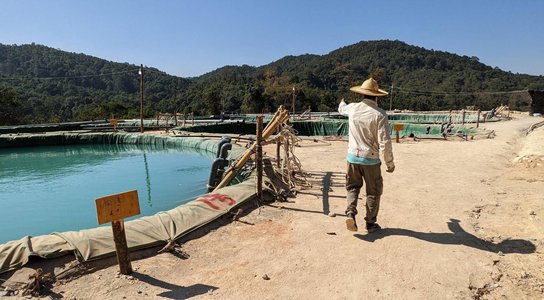15 December 2021 – Rubies fuelling brutal conflict and human rights abuses in Myanmar (also known as Burma) are highly likely to be sold across the world by some of the best-known luxury brands, including Graff, Bulgari, Van Cleef & Arpels and Sotheby’s, reveals a groundbreaking investigation published today by Global Witness.
The Myanmar gemstone trade is a corrupt military racket run by the country’s top general, Min Aung Hlaing, and powerful ethnic armed groups, the investigation finds. By bringing the sector’s vast resources under its control, in the same way it has the jade trade, the military has been able to tighten its grip on power and bankroll atrocities, including the February 2021 coup.
“There is no such thing as an ethically sourced Burmese ruby,” said Clare Hammond, Senior Myanmar Campaigner at Global Witness. “These gemstones are sold as symbols of human connection and affection, yet the supply chain is steeped in corruption and horrific human rights abuses.”
As renowned jeweller Harry Winston publicly announces their decision to stop sourcing gemstones from Myanmar based on ethical concerns, pressure is mounting on big name jewellery houses to do the same.
Our analysis indicates that at full production Myanmar’s coloured gemstone industry was worth an average of $346 million to $415 million a year based on official production data. This estimate is conservative, with sources suggesting that the sector could in reality, be worth as much as five times more.[1]
This investigation reveals that since the 2021 coup, soldiers have been making money yet again, by systematically extorting payments for the right to dig rubies and other gemstones. All gemstone mining is currently illegal in Myanmar, following the expiration of the last mining license in 2020, and commercial mining has all but stopped. However, tens of thousands of informal miners have filled this void, and are being exploited by the military as well as non-state armed groups. Meanwhile, the military is cashing in by holding gemstone fairs for unscrupulous buyers.
Since the 1990s, Myanmar’s military has consolidated control over the country’s ruby mines, violently dispossessing local communities to secure profits. It has granted mining licenses to its own powerful conglomerates, Myanmar Economic Corporation (MEC) and Myanmar Economic Holdings Limited (MEHL), which has used its revenue to fund officers and units that commit atrocities, Global Witness reveals. Both these corporations are controlled by Min Aung Hlaing, the architect of the 2021 coup, who faces allegations of genocide and crimes against humanity.
The military has used the country’s significant gemstone wealth to buy off armed opposition to its rule, lining its coffers by granting lucrative ruby mining licences to ethnic armed groups. Nominally enemies, the powerful United Wa State Army, the Shan State Army-North and other groups in Shan State have profited from and are compromised by their business relationships with the military.
As well as running companies that operate large mines, ethnic armed groups use their control of areas near the ruby mines and of Myanmar’s border regions to extort money from miners and traders. Crucially, they smuggle rubies into Thailand, where they are cut, polished and treated before being sold to jewellery companies from around the world.
Luxury brands – like Graff and Sotheby’s – are burying their heads in the sand and selling rubies that are highly likely to be funding conflict on to unwitting consumers. Of more than 30 international jewellers, auction houses and mass-market retailers contacted by Global Witness, only four – Tiffany & Co., Signet Jewellers, Boodles and Harry Winston – declare publicly that they have stopped sourcing gemstones from Myanmar.
By the time rubies reach Thailand, where most of Myanmar’s rubies are processed, Global Witness found that many dealers have no idea which mines they came from and often don’t even try to find out. Only one of more than 20 Global Witness spoke to for the investigation, Faidee Gems, could identify a specific mine from which it had sourced gemstones. That mine has been owned by military conglomerate MEHL for at least 20 years.
“Jewellery companies must demand transparency from suppliers. It is almost impossible to oversee the supply chain of a Myanmar ruby. And until they know that they are being sourced responsibly, they must stop selling Myanmar rubies. The fact that a handful of brands have already acted leaves the others with no excuse not to follow suit,” said Clare Hammond.
Many international top brands such as Chopard and Boucheron buy rubies from Mozambique, where Gemfields emerged as a rival supplier of rubies in the early 2010s, but Gemfields’ mining operations have been connected to severe human rights abuses and corruption. Rubies from Gemfields’ operations in Mozambique do not offer an ethical alternative to sourcing gemstones from Myanmar.

